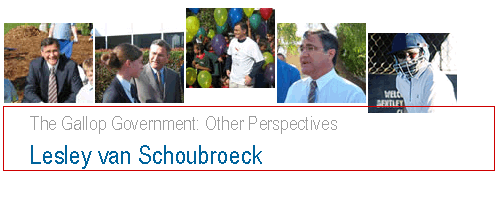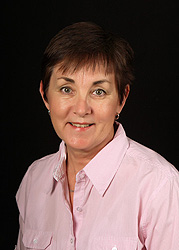
Dr Lesley van Schoubroeck was born in Queensland and has worked in the Western Australian public sector since arriving here to teach mathematics in 1971. After leaving teaching in 1984, she has undertaken a wide range of roles in strategic policy and planning across government. She lived near Gallop�s electorate during his time in parliament and worked in his department while he was premier. Lesley recently completed a doctoral thesis at Griffith University on Gallop�s five years as premier.
Her thesis is available in the Geoff Gallop Collection. See Gallop's Government: Strengthening Coordination in the Shadow of History.
As a local member, Geoff Gallop was everywhere – at community meetings, at the local swimming pool, at the shopping centres and in the suburban press. To public servants as he rose from Minister for Education in the Lawrence Government to Premier in 2001, he was recognised as one of those Ministers who wrote ‘Thank you’ on briefing notes and was known to send the latest research on a wide range of topics.
Expectations of him among public sector ‘policy wonks’ were huge when he became Premier. Outstanding recommendations arising from the Commission on Government as well as national and international reforms were brought out and competed for his attention while the pragmatics of politics and delivering on promises to the electorate drove his Office and his Government. There was an expectation that frustrations with public sector legislation introduced under the Court Liberal Government would disappear as a matter of priority.
Gallop’s commitment to social justice and to the environment raised the bar across the public sector. It changed the profile of people whose ideas were legitimate and should be heard. There was a sense of disappointment that many reforms did not gain traction but after his resignation there was a greater appreciation of his approach among both politicians and public servants. In many respects, his reforms brought Western Australia up to date with the rest of Australia but he was also constrained by legislation and precedents set by earlier administrations.
 Lesley van Schoubroeck.
Lesley van Schoubroeck.
Photograph courtesy Lesley van Schoubroeck.
Gallop’s commitment to social justice and to the environment raised the bar across the public sector. It changed the profile of people whose ideas were legitimate and should be heard. There was a sense of disappointment that many reforms did not gain traction but after his resignation there was a greater appreciation of his approach among both politicians and public servants. In many respects, his reforms brought Western Australia up to date with the rest of Australia but he was also constrained by legislation and precedents set by earlier administrations.
Was he too nice to be Premier? Did he fail to ensure that his policy initiatives made a difference on the ground? Should he have paid more attention to implementation? How could he have achieved more?
Other jurisdictions and now Western Australia under the Barnett Government have driven implementation through key appointments in the public sector, particularly in the Premier’s Department. The last Western Australian Govenrment to make extensive appointments within the mainstream public sector was the Labor Government of the 1990s. In the light of the history of the Western Australian Labor Party during that period, and the findings of the Corruption and Crime Commission since Gallop’s resignation, his reticence to repeat any of those practices is understandable. Some considered this reticence wise—to others it reflected a lack of determination.
I anticipate that history will judge Gallop not so much for his specific policy achievements in office but on the standards of ethics and integrity that he set. It will be a benchmark. This is not to say his Government did not achieve a lot, but it had an ambitious agenda and it is undoubtedly true that Governments are judged more on their failures than their successes. Such is the price we pay for freedom of the press and a democracy where Governments can rise and fall on the preferences of a small proportion of voters.
Gallop knew that compromise was essential to winning Government, and to good government. He may have been uncomfortable with it at times, but he knew it came with the job.


